pzgr40
Well-Known Member
Cutaway model of a WW2 British 25 pounder propaganda shell. These shells were made in situ by modifying a 25 pounder smoke shell. The base plate was removed and the three smoke pots were removed. Below the pusher plate two millboard discs without a hole were placed and either one roll of big pamphlets (215x135mm / 8.46 x 5.3 inch) or two rolls of small pamphlets (135 x 107mm / 5.3 x 4.2 inch) were placed in the projectile body. The space between the pamphlet rolls and the base plate is filled with millboard discs, after which the base plate is screwed back in place.
Before firing the shell, the pyrotechnic time and impact fuze 221 is set to the desired time so the pamphlets are ejected above enmy troops, villages or city’s. The shell is fired and the fuze ignites the expulsion charge which starts pushing on the pusher plate, the roll(s) of pamphlets and the base plate. The two windings of thread of the base plate are ripped off and the pamphlets are ejected from the base of the projectile. The pamphlet are dispersed over a large area as they float down from several hundred meters.
Picture 05 is interesting; from left to right one can see a 25 pounder smoke shell in a vice while unscrewing the base plate, the person beside is removing the smoke pots, the third person is seen stowing the smoke pots away, and the person on the right inserts the roll of large pamphlets.
Picture 08; sometimes ejection did not go as planned and the shell ended up as a dud. This was –probably the result of rolls being inserted to tight in the shell body, either too loose. These pamphlets can be recognizes because they are severely wrinkled as the rolls of pamphlets are compressed and scorched, caused by the flame of the ejection charge.
Muzzle velocity of shell : between 198 m/s (650 ft/sec) and 532 m/s (1745 ft/sec)
Range : 12.253mtr.( 13.400 yards).
Length projectile : 432 mm (17 inch)
Diameter projectile : 87,6 mm (3,45 inch)
Regards, DJH
Before firing the shell, the pyrotechnic time and impact fuze 221 is set to the desired time so the pamphlets are ejected above enmy troops, villages or city’s. The shell is fired and the fuze ignites the expulsion charge which starts pushing on the pusher plate, the roll(s) of pamphlets and the base plate. The two windings of thread of the base plate are ripped off and the pamphlets are ejected from the base of the projectile. The pamphlet are dispersed over a large area as they float down from several hundred meters.
Picture 05 is interesting; from left to right one can see a 25 pounder smoke shell in a vice while unscrewing the base plate, the person beside is removing the smoke pots, the third person is seen stowing the smoke pots away, and the person on the right inserts the roll of large pamphlets.
Picture 08; sometimes ejection did not go as planned and the shell ended up as a dud. This was –probably the result of rolls being inserted to tight in the shell body, either too loose. These pamphlets can be recognizes because they are severely wrinkled as the rolls of pamphlets are compressed and scorched, caused by the flame of the ejection charge.
Muzzle velocity of shell : between 198 m/s (650 ft/sec) and 532 m/s (1745 ft/sec)
Range : 12.253mtr.( 13.400 yards).
Length projectile : 432 mm (17 inch)
Diameter projectile : 87,6 mm (3,45 inch)
Regards, DJH
Attachments
-
 01 - 25 pounder propaganda shell.jpg664.1 KB · Views: 77
01 - 25 pounder propaganda shell.jpg664.1 KB · Views: 77 -
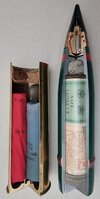 02 - 25 pounder propaganda shell.jpg1.6 MB · Views: 80
02 - 25 pounder propaganda shell.jpg1.6 MB · Views: 80 -
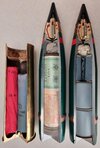 03 - 25 pounder propaganda and 25 pounder smoke.jpg2.4 MB · Views: 75
03 - 25 pounder propaganda and 25 pounder smoke.jpg2.4 MB · Views: 75 -
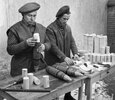 04 - changing smoke to propaganda 24-01-1945 near Roermond.jpg381.8 KB · Views: 72
04 - changing smoke to propaganda 24-01-1945 near Roermond.jpg381.8 KB · Views: 72 -
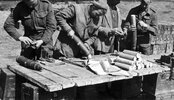 05 - Filling 25 pdr smoke with large pamphlets in Italy.jpg127.2 KB · Views: 68
05 - Filling 25 pdr smoke with large pamphlets in Italy.jpg127.2 KB · Views: 68 -
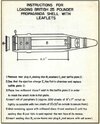 06 - regulation modifying smoke to propaganda with 25 pdr shell.jpg79.3 KB · Views: 67
06 - regulation modifying smoke to propaganda with 25 pdr shell.jpg79.3 KB · Views: 67 -
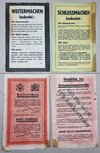 07 - Large pamphlets 215 x 135 mm.jpg2.7 MB · Views: 71
07 - Large pamphlets 215 x 135 mm.jpg2.7 MB · Views: 71 -
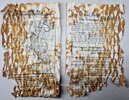 08 - Small pamphlets from dud.jpg2.6 MB · Views: 71
08 - Small pamphlets from dud.jpg2.6 MB · Views: 71
